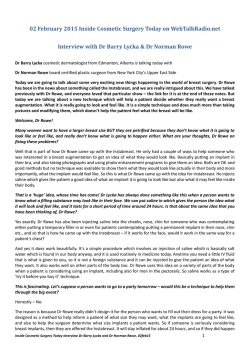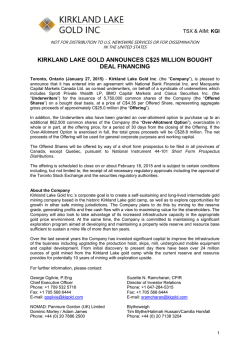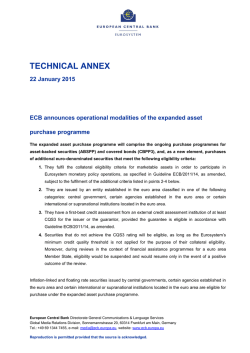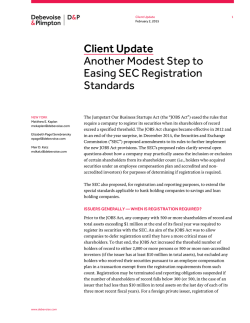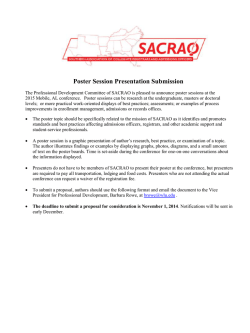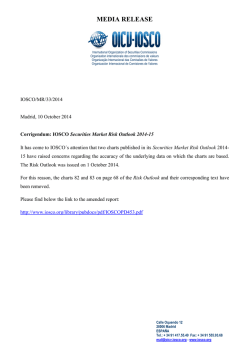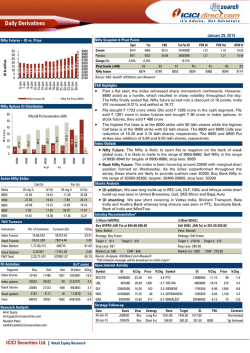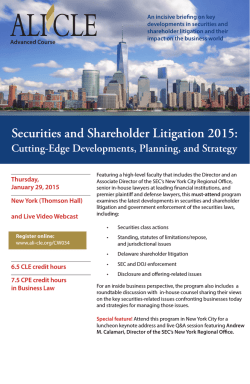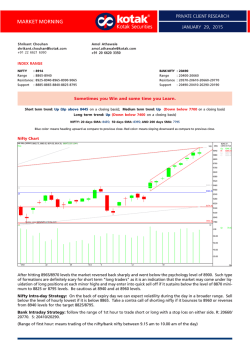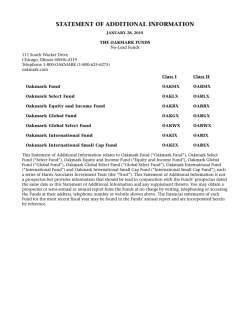
Stable Value Common Trust Fund (Class B)
Stable Value Common Trust Fund (Class B)
OBJECTIVE
INVESTMENT STRATEGY
The Trust seeks to provide maximum current
income while maintaining stability of
principal.
l
l
Not FDIC-insured. May lose value. No bank
guarantee.
Quarterly Trust Update as of 12/31/2014
The Trust will invest primarily in
Guaranteed Investment Contracts
(GICs), Bank Investment Contracts
(BICs), Synthetic Investment Contracts
(SICs), and Separate Account Contracts
(SACs).
GICs, BICs, SICs, and SACs are types of
investment contracts that are
designed to provide principal stability
and a competitive yield.
TRUST MANAGEMENT
KEY TRUST DATA
Antonio Luna and Robert Madore are
co-portfolio managers for the Stable Value
Fund and vice presidents of T. Rowe Price
Group, Inc., T. Rowe Price Associates, Inc.,
and T. Rowe Price Trust Company. Prior to
joining T. Rowe Price in 1996, Antonio
worked with The Ryland Group in its
Mortgage Structuring Division. Antonio
earned a B.S. in business administration
from Towson University and an M.S. in
finance from Johns Hopkins University. He
also has earned the Chartered Financial
Analyst designation. Prior to joining T.
Rowe Price in 2001, Robert was a senior vice
president and portfolio manager at Putnam
Investments. Robert earned a B.A. from the
University of Connecticut.
Assets (millions):
Inception Date:
BENEFITS AND RISKS
INVESTOR PROFILE
l Offers potential stability of principal by
l
purchasing high-quality GICs, BICs, SICs,
and SACs, however, there is no assurance
that the credit quality of the issuers will
remain the same over the life of the
investment.
l Because such investments are not actively
traded in the open market and generally
must be held until maturity, there is a risk
that, like any investment, one or more of
the Trust's holdings could fail to make
scheduled interest and principal payments
prior to maturity, potentially reducing the
Trust's income level and causing a loss of
principal.
l The Trust attempts to minimize such risks
by diversifying its investments by issuer,
quality, and duration.
l
The Trust may be suitable for
retirement plan investors
seeking high credit quality and
current income who can accept
some risk.
Investments in the Trust may
not substantially outpace
inflation over time, so
participants who invest solely in
this conservative Trust may not
be able to save enough for their
retirement years.
INVESTMENT STYLE
Stable Value
RETURNS
$11,393.8
Average Annual Returns
September 12, 1988
Trustee Fee:1
0.25%
Total Annual Operating
Expenses per $1,000:
$2.50
Average Manager tenure:2
Trust Holdings Turnover:
15 years
31.1%
1 As of 12/31/2014. Figure is equivalent to the
annual Operating Expense ratio.
2 Average number of years managing the
strategy.
The Trust incurs investment-related
expenses for the SICs and SACs that it holds
(i.e., fees paid to issuers of SICs and SACs
and custody fees on underlying assets).
These fees are paid from underlying assets
of the SIC or SAC and reduce the respective
contract’s crediting rate, thereby reducing
interest income earned by the Trust. Based
on available information for the current
quarter, these fees are estimated to be
0.21% on an annualized basis (with fees to
wrap issuers of approximately 0.21% and
custody fees of less than 0.00%). The
Trust’s average annual returns shown are
net of these fees. Consistent with their
accounting as a reduction of income, these
fees are not included in computing the
Trust’s annual operating expense ratio.
About T. Rowe Price Trust Company
·
Maryland-chartered, limited-purpose trust
company established in 1983
·
Offers a variety of common trust funds (also
known as collective investment funds)
exclusively to retirement plans and their
participants
·
Part of the T. Rowe Price family of companies
3 Months
1 Year
3 Years
5 Years
10 Years
Trust
0.53%
2.04
2.21
2.80
3.59
Citigroup
3-Month
Hueler Pooled
Treasury Bill Fund Universe
0.00%
0.44%
0.03
1.69
0.05
1.93
0.07
2.32
1.46
3.34
The T. Rowe Price Stable Value Common Trust Fund (the "Trust") is
not a mutual fund. It is a common trust fund established by T.
Rowe Price Trust Company under Maryland banking law, and its
units are exempt from registration under the Securities Act of 1933.
Investments in the Trust are not deposits or obligations of, or
insured or guaranteed by, the U.S. government or its agencies or T.
Rowe Price Trust Company. Although the Trust seeks to preserve
the value of your investment at $1.00 per unit, it is possible to lose
money by investing in the Trust.
Performance figures are shown net of fees and include any
changes in principal value and reinvested dividends. All returns are
historical and do not represent future performance.
Portfolio holdings are historical and subject to change. This
material should not be deemed a recommendation to buy or sell
any securities mentioned. When assessing performance, investors
should consider both short-term and long-term returns.
The Hueler Pooled Fund Universe ("Universe") is provided by
Hueler Analytics, a Minnesota-based consulting firm, which has
developed the Universe for use as a comparative database to
evaluate collective trust funds and other pooled vehicles with
investments in GICs and other stable value instruments. The
Universe is comprised of pooled stable value funds with common
investment objectives of stability of principal; the number of
participating funds in the Universe may vary over the different
historic periods. Total return performance is calculated by taking
the straight average of the monthly returns of the funds
participating in the Universe during each month which are then
linked to derive the index returns for all other time periods.
Universe rates of return are reported gross of management fees.
Periods less than one year are not annualized.
The Citigroup 3-Month Treasury Bill listed in the Returns table
above is the Trust’s benchmark. For more investment related
information, call 1-800-228-5132 or log on to our website at
www.rps.troweprice.com
Quarterly Trust Update as of 12/31/2014
Stable Value Common Trust Fund (Class B)
ASSET ALLOCATION
More Info about T. Rowe Price
· Founded in 1937
· Commitment to fundamental in-house
EFFECTIVE MATURITY RANGES
research with 212 dedicated analysts
40.7 Corporate, Foreign, & Gov't Entities
8.2% 0-1 Years
27.1 U.S. Treasuries, Agencies, & Other
12.0% 2-3 Years
13.8 Mortgage-Backed Securities
79.8% 3-4 Years
·
Portfolio managers have an average tenure
of 16 years with the company
·
·
Strict adherence to investment style
·
Experienced in international investing with
offices in London, Hong Kong, Singapore,
Tokyo, Sydney, and Baltimore
Solid performance with a risk-aware
investment approach
10.2 Asset-Backed Securities
7.6 Reserves
0.6 Guaranteed Investment Contracts (GICs)
T. Rowe Price uses a custom structure for sector and
industry reporting on this product.
QUALITY DIVERSIFICATION †
n
n
n
n
n
18.2% U.S. Treas*
17.2% AAA
17.0% A
0.8% Short- Term
n
n
n
n
TOP HOLDINGS
Synthetic Investment Contracts (SICs)
73.7%
Separate Account Contracts (SACs)
18.2
Reserves
7.6
Guaranteed Investment Contracts (GICs)
0.6
16.5% U.S. Govt Ag**
6.2% AA
16.6% BBB
0.0% Not Rated
PORTFOLIO CHARACTERISTICS
7.6% Reserves
Trust
Weighted Average Maturity
3.01 years
Weighted Average Effective Duration
3.00 years
30-Day Effective Yield
2.13%
Market to Book Ratio
101.5%
Number of Holdings
11
†Source for quality diversification: Moody’s Investors Service; if Moody’s does not rate a security, then Standard & Poor’s
(S&P) is used as a secondary source. When available, T. Rowe Price will use Fitch for securities that are not rated by Moody’s or
S&P. T. Rowe Price does not evaluate these ratings, but simply assigns them to the appropriate credit quality category as
determined by the rating agency. T. Rowe Price uses the rating of the underlying investment vehicle for credit default swaps.
*U.S. Treasury securities are issued by the U.S. Treasury and are backed by the full faith and credit of the U.S. government. The
ratings of U.S. Treasury securities are derived from the ratings on the U.S. government.
**U.S. government agency securities are issued or guaranteed by a U.S. government agency, and may include conventional
pass-through securities and collateralized mortgage obligations; unlike Treasuries, government agency securities are not issued
directly by the U.S. government and are generally unrated but may have credit support from the U.S. Treasury (e.g., FHLMC
and FNMA issues) or a direct government guarantee (e.g., GNMA issues). Therefore, this category may include rated and
unrated securities.
Certain numbers in this report may not equal stated totals due to rounding.
The Stable Value Fund (SVF) imposes a 90-day “equity wash” provision on exchanges to competing funds. The SVF is interest
rate sensitive; therefore, direct exchanges from the SVF to money market funds and certain short-term bond funds are not
permitted. “Permissible” or “eligible” investment options include most common stock funds and any fixed-income fund with a
duration that is equal to or greater than three years. Exchanges from the SVF must remain invested in eligible investment
options for at least 90 days before exchanging into a competing fund.
T. Rowe Price Trust Company, Distributor
Definitions
Market to Book Ratio — In calculating the ratio,
the market value of the unwrapped reserves and
the market value of GICs is deemed to equal book
value. SACs/SICs are at market value.
Weighted Average Maturity is an average of the
maturities of the underlying bonds, with each
bond’s maturity weighted by the percentage of
fund assets it represents. Weighted Average
Effective Duration is a calculation that seeks to
measure the price sensitivity of a bond fund to
changes in interest rates. In general, the longer
the average maturity or duration, the greater the
fund’s sensitivity to interest rates. Duration is a
better indicator of price sensitivity because it
takes into account the time value of cash flows.
Yield — The income per unit paid by the Trust to
its unit holder over a given period of time.
SVF-B
01/2015
© Copyright 2026

